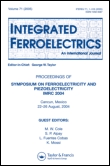
INTEGRATED FERROELECTRICS
Scope & Guideline
Connecting Science and Engineering in Ferroelectrics
Introduction
Aims and Scopes
- Ferroelectric Materials and Devices:
The journal covers a wide range of studies on ferroelectric materials, including their synthesis, characterization, and applications in devices such as sensors, actuators, and energy storage systems. - Dielectric Properties and Applications:
Research on dielectric materials is a core focus, exploring their electrical properties and potential applications in capacitors, insulators, and high-frequency devices. - Energy Harvesting Technologies:
Publications often feature advancements in energy harvesting technologies, particularly those utilizing piezoelectric and ferroelectric materials for sustainable energy solutions. - Nanostructured Materials:
The journal promotes research on nanostructured and composite materials that enhance the performance of ferroelectric devices, contributing to the development of next-generation applications. - Theoretical and Computational Studies:
Theoretical approaches, including first-principles calculations and simulations, are encouraged to complement experimental findings and provide insights into material behavior.
Trending and Emerging
- Lead-Free Ferroelectric Materials:
With increasing regulatory scrutiny on lead-based compounds, there is a significant rise in research dedicated to developing lead-free alternatives, such as bismuth sodium titanate (BNT) and other eco-friendly compositions. - Multifunctional Materials:
Emerging studies focus on multifunctional materials that integrate ferroelectric, piezoelectric, and magnetic properties, paving the way for innovative applications in sensors and actuators. - Integration of Artificial Intelligence and Machine Learning:
There is a growing trend towards utilizing AI and machine learning techniques to optimize material design and predict the properties of ferroelectric materials, enhancing the efficiency of research and development. - Nanoengineering and Hybrid Systems:
Research is increasingly focusing on nanoengineered materials and hybrid systems that combine ferroelectric components with other materials to enhance performance in applications like energy harvesting and flexible electronics. - Sustainability and Green Materials:
The journal is seeing a rise in studies addressing the sustainability of materials, focusing on the development of green synthesis methods and the use of renewable resources in ferroelectric material fabrication.
Declining or Waning
- Traditional Ferroelectric Materials:
Research on conventional ferroelectric materials such as lead-based ceramics has decreased, likely due to increasing environmental concerns and regulatory pressures on lead usage. - Simple Structural Characterization Techniques:
There is a noticeable decline in studies relying solely on basic structural characterization techniques, as the field increasingly emphasizes advanced methods like synchrotron X-ray diffraction and electron microscopy. - Applications in Legacy Technologies:
Papers focusing on outdated or less relevant applications of ferroelectric materials, such as in traditional electronics, have become less frequent, indicating a shift towards more innovative and impactful technologies.
Similar Journals
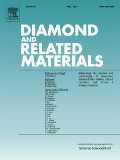
DIAMOND AND RELATED MATERIALS
Connecting theory with application in diamond research.DIAMOND AND RELATED MATERIALS, published by Elsevier Science SA, serves as a premier international platform for the dissemination of high-quality research in the fields of materials science, electrical engineering, and chemistry, with a specialized focus on diamond and its related materials. With an ISSN of 0925-9635 and an E-ISSN of 1879-0062, this journal has established itself within the top quartiles, reflecting its influential contribution to the scientific community, particularly in the categories of Chemistry (miscellaneous) and Electrical Engineering, among others. The journal's wide scope encompasses both theoretical and applied aspects of diamond research, making it an essential resource for professionals and academics alike. The current rankings position it favorably within its respective disciplines, with a notable 79th percentile in General Physics and Astronomy and strong standings in related categories. Although it does not offer open access, researchers can stay informed of cutting-edge advancements and methodologies through its comprehensive articles and reviews, enriching the wider discourse in advanced materials research.
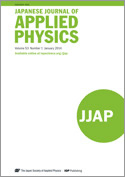
JAPANESE JOURNAL OF APPLIED PHYSICS
Elevating the Standards of Applied Physics ScholarshipThe Japanese Journal of Applied Physics is a premier publication in the field of applied physics, offering a platform for researchers and professionals to present their findings and innovations. Published by IOP Publishing Ltd, this esteemed journal has been active since 1963 and continues to contribute significantly to the understanding and advancement of applied physics across diverse applications. The journal is recognized for its rigorous peer-review process and high-quality publications, evidenced by its 2023 ranking of Q2 in Engineering (Miscellaneous) and Q3 in Physics and Astronomy (Miscellaneous). With an accessible ISSN of 0021-4922 and E-ISSN 1347-4065, the journal cultivates a global readership, fostering collaboration and innovation within the scientific community. Although the journal does not currently offer open access options, its valuable insights into the latest technological advancements and theoretical developments remain crucial for students, researchers, and industry professionals alike. By bridging the gap between fundamental physics and practical applications, the Japanese Journal of Applied Physics plays a vital role in shaping the future of applied sciences in Japan and beyond.

Transactions on Electrical and Electronic Materials
Transforming Ideas into Impactful Engineering SolutionsTransactions on Electrical and Electronic Materials, published by Springer, is a distinguished journal aimed at advancing the fields of electrical and electronic engineering, as well as electronic, optical, and magnetic materials. With an ISSN of 1229-7607 and an E-ISSN of 2092-7592, this journal is vital in disseminating impactful research and innovations, providing insights and significant findings that cater to both academia and industry. Holding a Q3 ranking in the categories of Electrical and Electronic Engineering and Electronic, Optical and Magnetic Materials, it serves as a reputable platform for sharing research that influences ongoing developments in these critical areas. The journal's converged years from 2011 to 2024 signify its commitment to providing a comprehensive review of technological advancements. Located in New York City, it appeals to a global audience of researchers, professionals, and students, enhancing their understanding of current trends and practices within the domain.
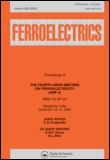
FERROELECTRICS
Elevating Understanding of Electronic and Optical MaterialsFERROELECTRICS, published by Taylor & Francis Ltd, is a distinguished journal focusing on the multifaceted field of ferroelectric materials and their applications, encompassing aspects of condensed matter physics and electronic, optical, and magnetic materials. Established in 1970 and set to continue through 2024, this journal provides a critical platform for researchers, professionals, and students seeking to explore the latest advancements in ferroelectric phenomena. Although currently categorized in the Q4 quartile in key scientific fields, this journal serves as an invaluable resource for community knowledge sharing and collaboration, despite a competitive landscape evidenced by its Scopus ranks in both related domains. FERROELECTRICS remains committed to fostering innovation and understanding in materials science, providing seamless access to valuable research insights. As this journal continues to evolve, it aims to uplift its standing and broaden its impact in the scientific community.
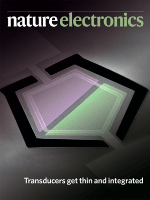
Nature Electronics
Exploring Breakthroughs in Electronic MaterialsNature Electronics is a premier journal in the field of Electrical and Electronic Engineering, published by NATURE PORTFOLIO. Established in 2018 and converging until 2024, it has swiftly positioned itself as a leading platform for groundbreaking research, holding a prestigious Q1 ranking in multiple categories including Electronic, Optical and Magnetic Materials, and Instrumentation according to the latest 2023 evaluations. The journal boasts an impressive Scopus ranking, securing the top position in Instrumentation and showcasing exceptional standings in both Electrical Engineering and Materials Science. With a commitment to disseminating high-quality research, Nature Electronics offers insightful access to the latest innovations and advancements in the electronics domain, making it an essential resource for researchers, professionals, and students alike. Engaging with this journal enables readers to stay at the forefront of technological progress and fosters discussion on the future of electronic materials and devices.

Nano Materials Science
Empowering Scientists to Shape Tomorrow's Materials.Nano Materials Science is a premier open-access journal dedicated to the dissemination of groundbreaking research in the fields of nanotechnology, materials science, and chemical engineering. Published by KEAI PUBLISHING LTD, this journal has quickly established itself as a leading platform in its area since its inception in 2019, with impressive rankings in the Scopus database, holding a Q1 position across multiple categories, including Chemical Engineering and Materials Science. Based in Beijing, China, Nano Materials Science provides researchers and practitioners access to a wealth of high-quality peer-reviewed articles, fostering innovation and collaboration within the scientific community. With its impact factor steadily rising and a commitment to open access, the journal aims to bridge the gap between theoretical research and practical applications, making it an essential resource for professionals and students eager to stay at the forefront of materials research and nanotechnology advancements.

PHYSICS OF THE SOLID STATE
Unveiling the Secrets of Electronic, Optical, and Magnetic MaterialsPhysics of the Solid State is a distinguished journal published by Pleiades Publishing Inc., focusing on the rapid advancements and fundamental research in the realms of condensed matter physics, electronic, optical, and magnetic materials. With an ISSN of 1063-7834 and an E-ISSN of 1090-6460, this journal serves as a crucial platform for disseminating high-quality research findings, insights, and reviews essential for both academic and industrial professionals in the field. As of 2023, its Scopus ranking places it in the 26th percentile for both Condensed Matter Physics and Electronic, Optical and Magnetic Materials, reflecting its evolving influence and contribution to the scientific community. Although currently classified in the Q4 quartile, the journal aims to foster interdisciplinary dialogue, improve research visibility, and enhance its impact on contemporary scientific challenges through rigorous peer-reviewed articles and focused special issues. Despite its traditional model of access, it continues to play a pivotal role in engaging researchers and fostering innovation in solid-state physics.

Crystals is a premier open-access journal, published by MDPI since 2011, that focuses on the multidisciplinary fields of chemical engineering, condensed matter physics, inorganic chemistry, and materials science. With its E-ISSN 2073-4352, the journal is headquartered in Switzerland, and actively contributes to the global scientific community by facilitating the dissemination of high-quality research. Ranking in the Q2 quartile across multiple categories, including Chemical Engineering (miscellaneous) and Materials Science (miscellaneous) for 2023, Crystals provides a platform for innovative studies that span from fundamental research to practical applications. The journal's commitment to open access ensures that groundbreaking findings are readily available to researchers, professionals, and students alike, fostering an environment of collaboration and knowledge sharing that is essential in advancing the scientific understanding of crystalline materials.
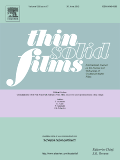
Thin Solid Films
Exploring the Frontiers of Thin Film TechnologyThin Solid Films, published by ELSEVIER SCIENCE SA, is a highly regarded journal in the fields of materials science and physics, specifically focused on the properties and applications of thin films. Established in 1967, this journal has been a leading platform for disseminating research on surfaces, coatings, and advanced materials. With its consistent publication through the notable HIndex of scholarly impact, this journal showcases a diverse range of studies ranging from electronic, optical, and magnetic materials to novel surface and interface engineering. In recent evaluations, Thin Solid Films has achieved significant rankings, including a Q2 position in Materials Chemistry and Metals and Alloys, reflecting its relevance and importance in ongoing scientific discourse. Although it does not offer open access, it provides a vital resource for researchers, professionals, and students seeking to advance their knowledge and expertise in thin film technology. The journal's commitment to quality and innovation makes it an essential publication for anyone engaged in the field.

MICROSYSTEM TECHNOLOGIES-MICRO-AND NANOSYSTEMS-INFORMATION STORAGE AND PROCESSING SYSTEMS
Advancing the frontiers of microsystems and nanosystems.MICROSYSTEM TECHNOLOGIES-MICRO-AND NANOSYSTEMS-INFORMATION STORAGE AND PROCESSING SYSTEMS is an esteemed scholarly journal published by SPRINGER HEIDELBERG, bringing together cutting-edge research in the fields of microsystems and nanosystems, with a specific focus on information storage and processing technologies. With its origins tracing back to 1994, this journal has established a solid reputation within the academic community and currently ranks in Q3 across key disciplines, including Condensed Matter Physics and Electrical and Electronic Engineering, as assessed by the 2023 category quartiles. The journal is notable for its contribution to advancing knowledge in Nanoscience and Materials Science, particularly in the domains of electronic, optical, and magnetic materials. As a pivotal resource for researchers, professionals, and students alike, it offers insights into innovative methodologies, applications, and breakthroughs in microsystems technologies that are shaping the future of electronics and computing. While currently not an open-access journal, it maintains a commitment to disseminating significant findings in the rapidly evolving landscape of information processing systems, fostering collaboration and knowledge exchange within the scientific community.